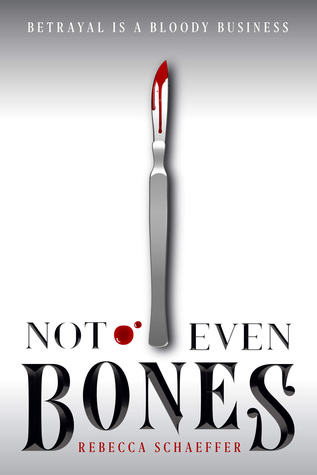Wow.
Just…wow. In a good way. In the best way. You want to know how to do horror and gore and also troubled family dynamics and colonialism in a single YA book? Look no further. Rebecca Schaeffer’s Not Even Bones is your dark remedy to the fact that Darkdawn got pushed back. This is one of the most innovative books I’ve read all year, and it doesn’t even seem to be trying hard. The whole concept feels so effortless, so intuitive, that you can miss how much thought and effort went into crafting this world and Nita’s place within it.
Nita is the daughter of some Very Bad People, traffickers in human remains. Specifically the remains of Unnaturals, people who have anything from enhanced healing to just rose-pink melanin. It doesn’t matter if those abilities persist after death, or accomplish anything: if there’s an Unnatural, someone will want the body.

That’s where Nita comes in. Nita doesn’t kill or maim. That’s as far as she’s willing to think about things, because she doesn’t like feeling bad. And dissecting bodies of the conveniently-already-dead makes her feel good. She really enjoys her work. Removing organs and powdering bone is the life she wants. Even when she’s kidnapped to be sold, she wants to get back to the life she had. Right?
Nita is an unusual but hardly unprecedented heroine in her clinical remove from her own emotions. She prefers medical textbooks and sterile dissection rooms to human interaction, but then again, with whom would she interact? Her parents have moved her all around the world and isolated her, since their black market business doesn’t exactly make friends. It’s hard to say whether it’s emotional trauma and neglect that have rendered her remote from others, or whether she has some innate neurological differences. I’m glad that it’s ambiguous, since slapping labels on things destroys the nuance of individuals, who are, as the book so succinctly and excellently points out: “people were never just one thing.”
Nobody is what they seem, and not in a trite, romantic way. The rude, broody hunk really is a sadistic maniac. No part of his sadistic mania is downplayed just because he also happened to have a rough childhood or supernatural hungers. This book makes no excuses for its characters, and yet manages to paint each of them as fully formed human beings. Not evil caricatures. Not even blood-spattered anti-heroes.
This has been compared to Dexter, which I see superficially, but it’s actually much closer to Godsgrave by Jay Kristoff. Mia and Nita don’t overlay perfectly, but Mia’s love of chemistry and Nita’s expertise in biology leads me to think they would get along. The heroines wrestle with trading their hearts for stones, so as to not feel badly about cutting people up. They both want vengeance and survival, not to gratify an urge.
Kovit, Nita’s maybe-captor maybe-ally, does need to feed an urge, but not for serial murder. He literally must feed on pain in order to survive. Though presumably he could get by on haunting ERs and speed-dating venues, causing pain directly is far more delicious to him. Literally. He is part of a particular strain of Unnatural who gravitate toward dictatorial regimes and crime families for employment, since torture feeds their bodies—and wreaks havoc with their minds. Having to subsist on human misery—from infancy no less—can skew anyone’s perceptions.
Perception of morality rather than absolute morality is a consistent theme in Not Even Bones, done with a deft touch. Two teenagers trying to survive in an already pitch-dark moral universe can only choose between bad and worse. And sure, they could swear to avenge their brethren and take down all black market crime, but their skills and resources are limited. Nita doesn’t even know how to throw a punch, and she misses about half the shots she takes with her gun (thank you, Rebecca Schaeffer, for making that realistic). Ideals die quickly in this world, but not hope.
A lot of times I have trouble with YA not considering the implications of its own fantasy or SF elements. Not Even Bones is not one of those books; it is meticulously and brilliantly conceived in the broad strokes and the details. Geopolitics and international police forces interact in the background of Nita’s life as she goes about her daily business of dissection and research.
What impresses me most is that Schaeffer understands how to build a world not from facts but also from ignorance. No one fully understands how certain Unnatural traits work or where they come from, and regular humans exploit and oppress Unnaturals out of fear or mistaken notions. Just like consuming tiger and pangolin for supposed magical qualities, people eat or even snort parts of Unnatural bodies to gain real or imagined effects. And to justify it to themselves, they consistently refer to Unnaturals by “it” or “that,” dehumanizing them as much as possible.
But humanity is a tricky concept, and blurry around the edges. Certainly the kidnappers, mobsters, and others involved in the black market have lost their humanity. Or, if they represent humanity—neither Nita nor Kovit have known anything else, after all—then maybe being human isn’t what they want in the end.
And that ending! I find cliffhangers torturous, but usually because they’re contrived. This ending is torturous because there is another entire year before the next book comes out. I wanted to howl. I think my “no!” did hit an impressively high octave when I read the last page. But I can’t complain, because this is the perfect example of a cliffhanger done right: the main story has been satisfyingly concluded, but the larger arc of loose ends carries questions—and not action—beyond the final page. I’m sure there will be action, and plenty of it, but nothing felt left undone for this book.
Not Even Bones will be published September 4th.
